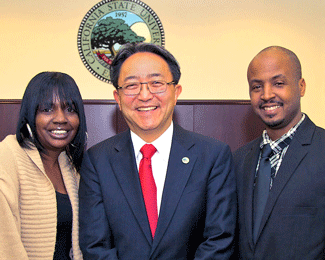Henrietta Lacks' family educates the CSUEB campus community

Cal State East Bay President Leroy M. Morishita was proud to welcome members of the Henrietta Lacks Family to the Hayward Campus on Monday, Feb. 17. He is shown here with Ms. Lacks' grandchildren Kim Lacks and David Lacks, Jr.
- February 17, 2014 4:20pm
As part of the kickoff for Cal State East Bay's "Week of Inclusive Excellence," members of Henrietta Lacks' family visited the university's Hayward Campus on Monday.
Two members of the family -- Kim Lacks and David Lacks, Jr. -- spoke to a campus community audience on Monday evening (Feb. 17) to further expand on the story told in the New York Times "best-selling" book, "The Immortal Life of Henrietta Lacks."
Before being hosted for lunch by the university Monday afternoon, CSUEB President Leroy M. Morishita had a private meeting with the Lacks family members in his office.
Henrietta Lacks was a poor black tobacco farmer whose cells, taken without her knowledge in 1951, went on to become the first immortal human ever grown in the laboratory. Those cells, nicknamed HeLa, became one of the most important tools in modern medicine, vital for developing the polio vaccine, cloning, gene mapping, in vitro fertilization, and more. Though she died in 1951, her cells -- alive and growing to this day -- are still the most widely used cell line in the world.
Members of the Lacks family have been fascinating audiences at unmiversities and libraries throughout the United States, talking about Henrietta Lacks and her important contributions to science. The international success of the book written by Rebecca Skloot has interested milions of readers in Ms. Lacks, her legacy, as well as her family. The Lacks family didn't find out until the 1970s that the cells existed.
While her cells have helped biotech companies make millions of dollars, her family has never benefited from the commercialization of HeLa cells. Despite what they has endured, the Lacks family say they are proud to honor the memory of Henrietta and her unparalleled contributions to science.
-- Barry Zepel